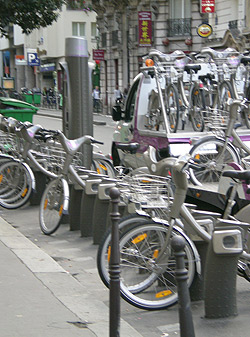
A bike from Velib. The word is a play on “velo,” which is French for bike, and “liberation,” which is the same thing in French and English. |
Apparently, we arrived in Paris on the heels of one Mayor Daley, who was in the City of Lights checking out Velib a couple of weeks ago.
What is Velib? One of the coolest and most frustrating things that I have come across in some time.
Don’t worry. Unless you’ve visited Paris in the past two months, you haven’t seen this. It’s a citywide bike distribution plan that has been attracting governmental attention worldwide. Basically, the city of Paris contracted JC Decaux (Chicago folks, this is the company behind some of our bus shelters) to design 10,000 bicycles with computer chips. They spread out the bikes throughout hundreds of “bike libraries” throughout the city. The idea is that a Parisian can check out a bike using his or her credit card, ride it across town, and deposit it at any other “bike library.” C’est cool, oui?
Oui—and non. The system is incredibly cheap: something like 5 Euros for a week and 30 Euros for the year. But you can only have the bike out for 30 minutes at a time, which means no leisure riding. This is a device for getting from point A to B. That’s it.
 
We wondered if anybody tended to the stations, since they’re unmanned and run by an ATM-like device. Then this purple truck pulled up. I guess they take the bikes in periodically to check tire pressure, chain movement, etc. |
Second, if the check-in spot is full, like ours was tonight, you have to ride around to find another station. Imagine trying to park your car, and all of the neighborhood garages are full, and you get charged if you go over 30 minutes of usage—starting to see the stressful aspect? We went to three stations around 11 o’clock tonight to return the bikes. We found two spots just as I started to panic.
Velib has sparked an interesting discussion for the man friend and me. Is Chicago a sophisticated enough populace to respect a system like this? I can imagine a Chicago punk tinkering with the bike and stealing it, or tampering with the computer chip until it malfunctions. What’s more, how would a city like Chicago organize the system? A majority of the population works in the Loop; if everybody rode bicycles to work, where would they park them? In Paris, it seems, things are a little more spread out among the neighborhoods.
What do you think? Do you see something like this in Chicago’s future?




